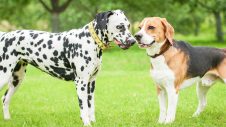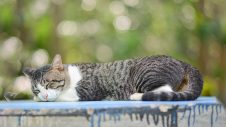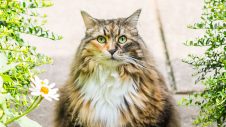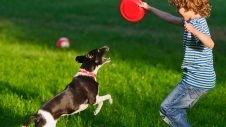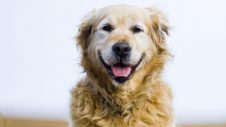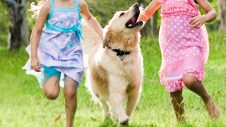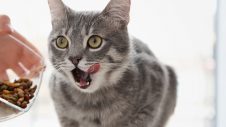The rate of obesity in dogs and cats in Australia is alarmingly high. According to research by the RSPCA, veterinarians reported that 33.5% of dogs are overweight, and of that, 8% are obese. Overweight pets usually become this way due to overfeeding and under-exercising. Like us, pets need to eat properly and undertake activity to keep fit and healthy.
Which Pets are Most at Risk?
In some cases, breed and age can play a part in a pet’s weight issue. Older pets may become less active due to conditions like arthritis. However, it’s up to us to ensure our pets are being fed correct food portions, and that they exercise regularly.
Does Your Pet Have a Weight Problem?
If you answer ‘yes’ to any of the questions below, or if you think your pet is not at its optimum body condition, you may want to talk to our veterinary team about a weight management program for your pet.
Weight Questions
- Do you have difficulty feeling your pet’s ribs?
- Is there little or no ‘waist’?
- Do you routinely give your pet table scraps or leftovers?
- Is your pet reluctant to exercise?
- Does your pet seem to tire easily with activity?
- Does your pet waddle when he/she walks?
- Does your pet keep eating so long as there is food in the bowl?
- Has your pet been desexed?
- Have you been told your pet is overweight?
- Does your pet struggle going up stairs, or jumping into the back of a car?
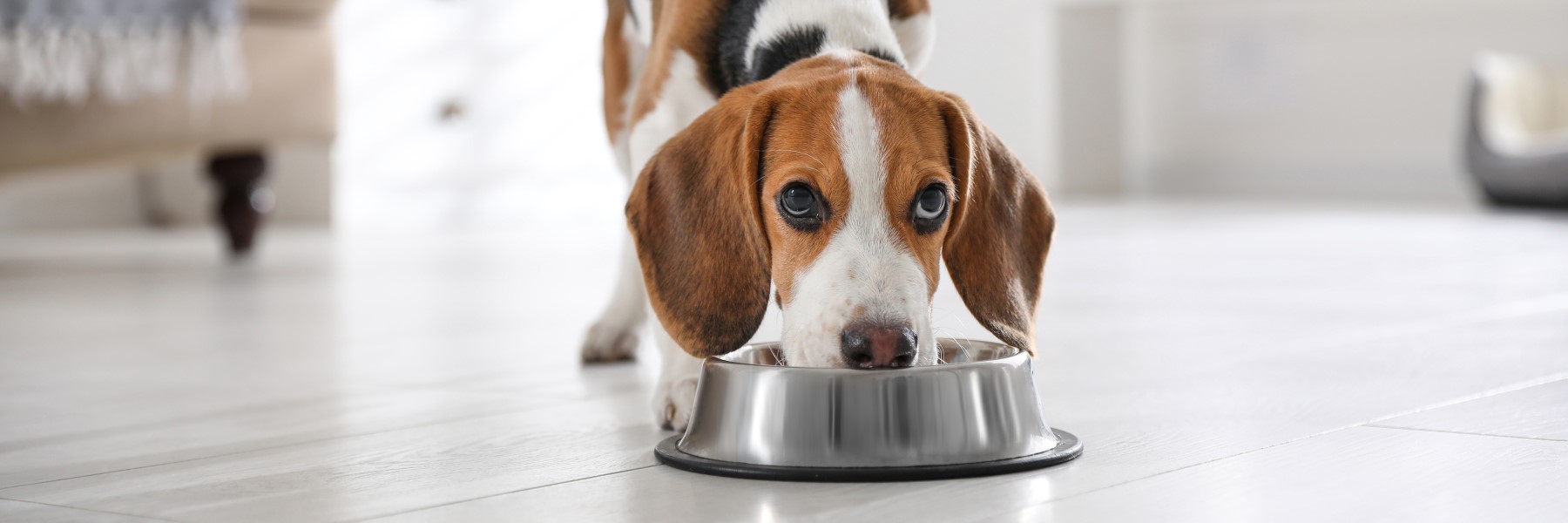
The Importance of a Complete and Balanced Diet
For humans and pets alike, a complete and balanced diet is crucial to keeping healthy. For our pets, such a diet ensures they are eating their core food groups: protein, carbohydrates, vitamins and minerals.
Our domesticated dogs are omnivores whilst our cats are obligate carnivores. Your Greencross Vet can help advise you on the specific diet that is right for your dog or cat.
Whilst treats are a great way to help train your dog and encourage your good behaviour, it’s important to choose healthy treats, and give in moderation. Overfeeding your dog with treats is a common cause of weight gain in dogs. Moreover, foods high in preservatives, sugars and processed foods can negatively impact your dog’s health and can lead to weight gain.
Life for Overweight Pets
Overweight pets are more likely to…
- Live a less active and shorter life
- Be less tolerant to the effects of heat and humidity
- Medications are based on weight, so the heavier they are the more medication they need
- Be more prone to joint and mobility problems
- Develop skin problems and a lower resistance to infection
- Be at greater risk during surgery
- Be disinterested in exercise and play
- Often have high blood pressure
- Be at greater risk of developing diabetes
Learn how to keep your pet healthy and happy by maintaining a healthy weight.
Why Pets Overeat
There are several reasons why your pet may be overeating:
1. Owner influence – we often equate an animal’s food requirements with our own. As a result, our pets are often fed the wrong types of foods and sometimes in excessive quantities. We empathise with our pets and often comfort feed.
2. Boredom or emotional stress – our pets are no different to us, they require stimulation in their day and like us, they fall victim to emotional or boredom eating.
3. Hormonal influence – When your pet is neutered, their metabolism may slow down due to hormonal changes. Particular breeds such as Labradors may be more susceptible. This, in combination with poor diet and lack of exercise, may see your pet’s waistline rapidly expand. There are other underlying endocrine diseases such as low thyroid disease that may also contribute to your pet’s obesity challenges and may require investigation by your veterinarian.
4. Competition in multi-pet households – a dominant animal may eat more than their fair share as a way of establishing a pecking order.
How Much Food Does Your Pet Need?
The amount of food your pet needs will depend upon the breed and size of the dog, as well as their age and level of activity. Your local Greencross Vets clinic will be able to provide more personalised and relevant dietary advice for your pet and their lifestyle. On average, your pet will usually need to be fed breakfast and dinner, with the amount of food determined by your pet’s weight. Age and health conditions are other factors that can affect your dog’s diet and portions.
Greencross Vets has developed numerous resources to help you find the best food for your pet. Read our The Food We Choose Counts Guide to understand the factors to take into consideration.
Overfeeding your pet is the leading cause of obesity in cats and dogs, whether it’s over- generous portions or too many treats. It’s important to follow the feeding guidelines provided by your vet to avoid unwanted weight gain and keep your pet healthy. Treats are treats and not snacks and should not occupy more than 10 % of the daily calories.

Health risks for overweight pets
Shorter lifespan
A study by the Waltham Centre for Pet Nutrition discovered that overweight dogs can expect to live ten months shorter than their ideal-weight counterparts. That’s a lot of time in dog years. Other research revealed that leaner dogs have a significant reduction in the risk of chronic diseases like osteoarthritis compared to overweight dogs.
Diabetes mellitus
As with humans, obesity increases insulin resistance in cats and dogs. Insulin is needed to break down sugar. When the body is unable to perform this function, diabetes develops, posing serious risks to your pet’s health. Ongoing treatment is needed for the management of this condition.
Overweight cats have twice the risk of developing diabetes than lean cats, while obese cats have almost four times the risk of developing diabetes. Additionally, with every 1kg of weight gain above the ideal weight in cats, there is a 30% reduction in insulin sensitivity. Insulin resistance also impairs the inability of glucose to enter the parts of the brain that tell us when we’re full. Therefore, your pet wants to keep eating, contributing to the problem of obesity.
Musculoskeletal diseases
Excess weight can contribute to musculoskeletal diseases, like ruptured ligaments and the onset of osteoarthritis.
In overweight pets, the load that joints and ligaments have to sustain is much higher, increasing the risk of rupture.
Osteoarthritis occurs earlier in obese dogs. This is attributed to chronic inflammation caused by obesity. This inflammation targets joints, leading to the onset of the disease.
Hypertension
Multiple studies have revealed a direct link between obesity and high blood pressure. High blood pressure leads to conditions of the eyes and puts pressure on the heart and kidneys.
Overeating Pets FAQs
How to Tell If Your Dog Is Overweight
A change in their body shape is usually the most convenient way to see whether your dog has gained weight.
You should be able to feel all your dog’s ribs without feeling a dense layer of fat covering them. You should not, however, be able to easily see their ribs. This would indicate your dog is underweight if you can see their ribs.
A “waist”, just like a person’s waist, should be seen in dogs with a healthy weight. Loss of the “waist” indicates excess weight.
What to Feed an Overweight Dog
If your dog is overweight, it’s important to feed your dog the diet set by your vet. Overweight dogs should be fed portioned nutrient rich meals and moderate treats to minimise their chances of extra weight gain. Excess fatty treats and table scraps are a common cause of weight gain in dogs and should be avoided to help your pet lose weight.
How to Help Your Overweight Dog Lose Weight
Just like with humans, diet and exercise will help your dog lose weight and improve their overall health. Diet is usually the leading cause of pet obesity and should be managed according to your vet’s guidance. Exercise, such as longer walks or more playtime, will help your dog exert more energy and burn their excess fat.
How to Tell If Cat Is Overweight
Just like with dogs, you can tell if your cat is overweight by their body shape. For healthy weight cats, you should be able to feel their spine below a thin layer of fat over their back.
What to Feed an Overweight Cat
Following the diet advice given by your vet will help your cat lose weight. It’s important to cut out excess treats and table scraps to limit fatty and high calorie foods. Your Greencross Vet can provide you with portion recommendations to avoid overfeeding.
If you’re concerned about your pet’s weight, contact your local Greencross Vets to make an appointment for a weight assessment.

 Greencross Vets
Greencross Vets 
